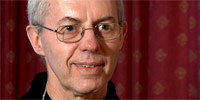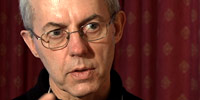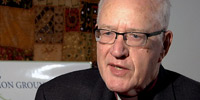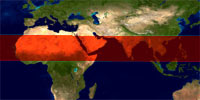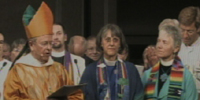In This Episode << SLIDE LEFT TO SEE ADDITIONAL SEGMENTS
Bishop Frank Griswold Extended Interview
Read more of Deryl Davis’s interview about Archbishop of Canterbury Rowan Williams with Bishop Frank Griswold:
On Rowan Williams:
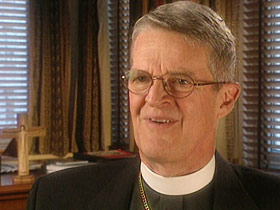
I’ve known Rowan since about the beginning of the ’90s, when he was Lady Margaret Professor of Divinity at Oxford University, and he is first of all a scholar. He’s very much a person of prayer, and he also is someone connected to the social issues of the day. He is a person who thinks broadly and widely, and he is able to translate classical theological concepts into contemporary realities. He’s also a poet, and that dimension also comes into play. I know that one of the things that he is most concerned about is religion once again capturing people’s imagination, being perceived as something alive, something engaging, something that draws us out of ourselves into an expanded sense of reality.
Having been a bishop for a number of years in addition to being a scholar, he [has] a pastoral sensitivity (he understands how people work, he understands their struggles at the most elementary level), and that hands-on experience as a bishop in Monmouth has prepared him wonderfully for the role he now has as Archbishop of Canterbury, because he has a sensitivity to people in a variety of contexts. He understands that the Gospel gets lived out in very different ways depending on where you are, depending on the issues you’re confronting, depending on the demands of your particular life and all that it contains. He’s going to be very good at speaking what I might call “a universal word” and helping different parts of the Anglican Communion across the globe to appreciate and understand each other at a very deep and integral level.
On spirituality:
I would say that Rowan Williams is by nature a contemplative, and by that I mean he takes the life of prayer very, very seriously. His prayer and his theology have in a very deep way become one. One of the ancients said that a theologian is one who prays, and I think that is a wonderful description and definition of Rowan. His prayer has opened him more and more deeply to the surprising mystery of God as it unfolds in different ways and stretches us and presents us with seeming contradictions and ambiguities that rationality simply can’t make sense of, and yet at that deeper level of encounter with the divine mystery of God, which is the heart of prayer, various things come together in ways that draw us beyond our normal patterns of knowing. That contemplative dimension… will serve him well as Archbishop of Canterbury.
On his interests:
What Rowan has is what I might call a catholic view of the world, in which everything is revelatory of God’s action, in which everything brings together in a very deep way the purposes of God, and so miners or dock workers on strike are just as important to Rowan as the classical definitions of the Holy Trinity. He’s always seeking ways in which classical theology can, in fact, inform contemporary life and be seen as part of the deepest meaning of what it is to be human.
On holding the Anglican Communion together:
The Anglican Communion, which is a series of self-governing churches that span 164 countries and which is divided into 38 provinces, is a fellowship that is more and more seeking to find its own identity. By that I mean, life in sub-Saharan Africa is very different from life in the United States or Canada or the United Kingdom, and one of things Rowan is going to have to face, as did George Carey, the Archbishop of Canterbury before him, is how do you take a worldwide communion that encompasses such divergent views, such different historical contexts, and give the various parts… a deep sense of its own commonality and interconnectedness? For example, if I were living in northern Nigeria, where there is a very strong and somewhat hostile, from a Christian point of view, Muslim population, I couldn’t enjoy the kind of theological breadth and latitude that I can enjoy here in the United States, where as a Christian I experience no hostility. Episcopalians here can think a number of things about issues and doctrines, whereas in northern Nigeria, for example, the church has to be absolutely of one mind if it is going to hold its own against a very resolute Islam. When bishops from northern Nigeria meet bishops from the United States, there is a discrepancy that is rooted and grounded in the difference of our two contexts. I think that’s part of the difficulty of the Anglican Communion finding its commonality, because we always see things from our own point of view… One of the challenges for the Archbishop of Canterbury is to help us inhabit one another’s contexts, to understand deeply and with compassion and an open mind how various people in different situations are struggling to be faithful to the Gospel, sometimes in different ways.
On sexuality:
Rowan’s views on sexuality are fairly broad and deeply compassionate. For some people, the dominant issue in their own theological consciousness is sexuality. But if ultimately orthodoxy is determined on the basis of one’s views of human sexuality, then we have experienced the ultimate sexualization of the church, because we are then saying the divergent views on sexual ethics are more important than our fundamental understandings of God. I think Rowan has his own personal views and is not shy about expressing them, but Rowan has also said very clearly (and it’s certainly something I deal with in this country), “I am someone who is called to be shepherd to the entire community, and therefore my own points of view are put aside in the service of a larger conversation that involves all points of view.”
On orthodoxy:
Rowan Williams’s theology is consummately orthodox. I think Rowan could probably run circles around most of us in terms of expounding in a very compelling way the classical doctrines of the Trinity [or] the nature of Christ. He is someone whose orthodoxy in my mind is beyond question, and you can’t question his orthodoxy solely because he sees grace at work in the lives of homosexual persons.
On the future:
There are people in the Anglican Communion who feel they understand exactly who Rowan Williams is. Some of them see him as either their enemy or their particular friend. I think we are all going to be surprised by Rowan because he’s very much his own person and isn’t easily typed, isn’t easily described. Whatever side of the divide we fall on, we’re all going to be surprised and led to new places and new understandings by this immensely prayerful and articulate exponent of the Christian faith.

